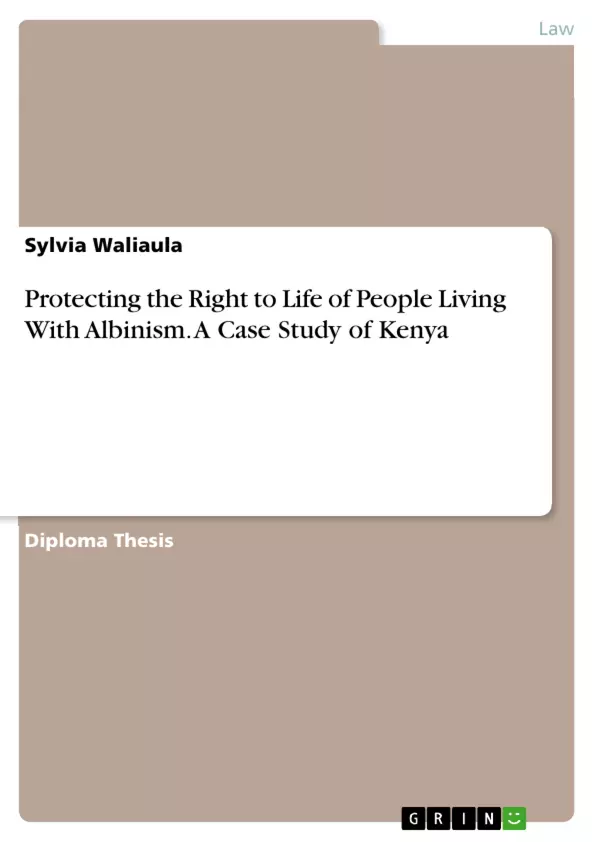This paper examines the question, how, based on the right to life, the lifes of people with albinism can and should be protected in the case of Kenya.
The Right to life is an inherent right, and both state and non-state actors have legal obligations to refrain from intentional and unlawful deprivation of life. In spite of this, the belief and practice of witchcraft are traditionally rooted in a number of African communities, this has led in a series of violations of the rights of persons living with albinism. The most barbaric of all being the evisceration of their body parts or bones, to use them in witchcraft rituals, aimed to bring success in one's life, cure diseases and also keep evil at bay.
Nevertheless, this study examines the legal significance of international treaties protecting the right to life and security of persons living with albinism. An illustration of the principles established in the Convention on the Rights of Persons with disabilities and other core international norms that ordinarily protect the right to life will be demonstrated. Notably, international human rights serve as a catalyst for legal change, through furthering the promotion of fundamental human rights. In light of this observation, this study illustrates national court cases, domestic laws and practices structured by the Kenyan government that comply with its international obligations, in promoting and preserving the right to life of people with albinism.
Inhaltsverzeichnis (Table of Contents)
- CHAPTER ONE
- 1.1 BACKGROUND INFORMATION
- 1.2 PROBLEM STATEMENT
- 1.3 RESEARCH OBJECTIVES
- 1.4 RESEARCH METHODOLOGY
- 1.5 RESEARCH QUESTIONS
- 1.6 OVERVIEW OF THE CHAPTERS
- CHAPTER TWO
- 2.1 INTRODUCTION
- 2.2 TREATY LAW PROTECTING THE RIGHT TO LIFE OF PEOPLE WITH ALBINISM
- 2.3 STATE DUTY TO PROTECT PEOPLE WITH ALBINISM
- 2.4 MONITORING AND COMPLIANCE OF INTERNATIONAL TREATIES
- CHAPTER THREE
- 3.1 INTRODUCTION
- 3.2 NATIONAL LAWS PROTECTING PEOPLE WITH ALBINISM
- 3.3 CONCLUSION AND RECOMMENDATIONS
Zielsetzung und Themenschwerpunkte (Objectives and Key Themes)
This project aims to investigate the protection of the right to life of people living with albinism in Kenya, focusing on the legal frameworks and the need for greater state protection.
- The prevalence of attacks and violence against people with albinism in Africa, particularly in Kenya and Tanzania.
- The role of international and national law in protecting the right to life of people with albinism.
- The state's responsibility to ensure the safety and security of its citizens, especially those facing discrimination and vulnerability.
- The need for comprehensive legal frameworks to address the specific challenges faced by people with albinism.
- The importance of raising awareness and promoting tolerance to combat harmful beliefs and practices that perpetuate discrimination.
Zusammenfassung der Kapitel (Chapter Summaries)
Chapter One introduces the background information on albinism, outlining the condition and its implications for individuals. The chapter also delves into the problem statement, identifying the vulnerability of people with albinism to attacks and violence driven by harmful beliefs and practices. It further presents the research objectives, methodology, and research questions, setting the stage for the subsequent analysis.
Chapter Two examines the international legal framework surrounding the protection of the right to life of people with albinism. It explores relevant treaties, state obligations, and monitoring mechanisms, highlighting the legal commitments to safeguarding human rights.
Chapter Three focuses on national laws in Kenya that aim to protect people with albinism. It evaluates existing legislation and identifies gaps in legal protection. This chapter also offers recommendations for strengthening legal frameworks and promoting awareness to address the challenges faced by this vulnerable group.
Schlüsselwörter (Keywords)
The core topics explored in this project include: albinism, right to life, human rights, discrimination, vulnerability, state responsibility, international law, national law, Kenya, Tanzania, attacks, violence, witchcraft, ritual practices, legal frameworks, protection, awareness, tolerance, and societal change.
Frequently Asked Questions
What is the main focus of this case study on albinism in Kenya?
The study examines how the right to life of people living with albinism can and should be protected within the legal framework of Kenya.
Why are persons with albinism targeted in certain African communities?
They are often victims of violence due to superstitious beliefs in witchcraft, where their body parts are used in rituals for success or to cure diseases.
Which international treaties protect the rights of people with albinism?
Key treaties include the Convention on the Rights of Persons with Disabilities (CRPD) and other core international human rights norms.
What is the Kenyan government's obligation regarding this issue?
The state has a legal obligation to prevent the intentional and unlawful deprivation of life and to comply with international human rights standards.
How do human rights serve as a catalyst for change?
International human rights standards encourage national governments to restructure domestic laws and court practices to protect vulnerable groups.
What are the recommendations of the study?
The study recommends strengthening legal frameworks, raising awareness, and promoting tolerance to combat harmful ritual practices.
- Quote paper
- Sylvia Waliaula (Author), 2018, Protecting the Right to Life of People Living With Albinism. A Case Study of Kenya, Munich, GRIN Verlag, https://www.grin.com/document/465857



